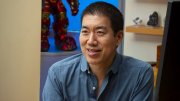Harvard Business School (HBS), established in 1908, on September 21 formally launched its first capital campaign. The timing might not seem propitious: the aftermath of the late 1990s stock-market bubble, recession, and widespread financial and accounting chicanery have given unwonted prominence to business matters.
In fact, those problemsacknowledged in the principal speeches made during the campaign kickoff eventshighlight some of the issues facing scholars and students of management and leadership within private enterprises. They lend an extra urgency to the school's work. The $500-million campaign, planned well before the current headlines, aims at sustaining HBS's mission by keeping its research, teaching, and students abreast of the effects of globalization, technology, and entrepreneurship on business practice.
"We're at an inflection point," says Howard H. Stevenson, putting those fundamental forces in context. He speaks expansively of the "three billion people who have come into the market economy in the last 12 years," creating enormous opportunities for private enterprise. Stevenson, the Sarofim-Rock professor of business administration and the intellectual godfather of entrepreneurial studies at HBS (see "Conceiving a Curriculum," March-April 2001, page 38), is attuned to possibilities like that. At the same time, he says, "The capacity to communicate has enlarged the reach" of businesspeople and consumers, so the "demand for knowledge about how organizations work is soaring."
In his other HBS role, as senior associate dean for external affairs, Stevenson has spent much of the last two years listening to alumni and faculty colleagues, helping to conceive the campaign. Everywhere he sees "how technology impacts the world of management" and the resulting difficulties of managing "the globalization enabled by the technology" across different languages, cultures, and even life goals. When he was a student (M.B.A. '65, D.B.A '69), he says, it might have been interesting, and sufficient, to understand a manufacturing plant in Milford, Connecticut; today, it requires utterly different knowledge to understand a manufacturing operation in Sichuan, China (which may be connected electronically to suppliers
and customers around the world). Then, he notes, his M.B.A. class had just eight women; today, HBS students need to be as diverse and global as possible.
Given those realities, Stevenson sees entrepreneurial behavior as imperative everywhere in businessin starting new companies, in adapting existing firms to rapid flux. And he finds the case for change compelling for HBS, too.
Dean Kim B. Clark makes it clear that such change will be grounded in the school's essential mission of "educating leaders who make a difference in the world." So even as it adapts, he says, "There is much about the school that needs to stay the same" in a changing world. HBS still sees its future as a residential teaching community informed by the best possible research and command of business practice.
Expounding the campaign's five principal goals, Clark begins in a place outsiders might find surprising: the need for funds for financial aid. Pursuing future leaders, he says, "compels us to seek out the very finest students we can find" and make it possible for them to attend "no matter what their circumstances." Support for a world student body is a $100-million campaign goal.
Traditionally, HBS (like the law school) has counted on graduates' future income to fund their professional education: it has offered relatively limited fellowships and focused primarily on helping students borrow the money for their M.B.A. years. ("Harvard's Financial Aid Failings," July-August, page 70, reports on financial aid across the graduate and professional schools.)
That formula now falls short. First, Stevenson points out, HBS today enrolls students from some six dozen countries as part of its global strategy. But "a poor kid from Mexico who has no life experience that it's a good investment" could easily be dissuaded from applying, he says. Second, the cost has become progressively dauntingwell over $100,000 in tuition, fees, and living expenses for the typical two-year program; with only limited fellowships (averaging $8,000 annually), the math can look prohibitive. Third, even for students who use debt financing, a multithousand-dollar annual repayment obligation (on the current average debt of $70,000) can become "a huge barrier in their job choice," Stevenson says. "We think people ought to follow their passions. Many of the best jobs don't pay best at the beginning."
Clark's second priority is the flip side of bringing people to HBS to study. "It has to do with our international work," he explainsa simple phrase embracing vigorous efforts to project the faculty out into the global marketplace. Above all, that means ramping up and sustaining international "case writing, research, and engagement with the world," for which the campaign seeks a second $100 million.
"Since 1989," Clark says, "we've seen unbelievably massive changes in the world's economy": the Soviet Union's dissolution, the opening of China, the emergence of new nations, deployment of new electronic technologies and their capital-market analogues (financial engineering, new forms of contracting and investment-management tools, freer and larger capital flows), and more expansive movement of people. From a school perspective, all that makes it imperative to "test our ideas against a broader range of experience," he says, and to expose students to the learning that comes from seeing such experiences as vividly as possible.
To date, HBS has opened small offices in Asia, Latin America, and Europe. Modeled on an earlier outpost in Silicon Valley, the centers facilitate research by visiting faculty members and case writers, who help prepare the problem-based materials used in HBS classes. They also establish beachheads from which to attract international businesspeople to the school as visiting lecturers or participants in classes and workshops.
Clark sees what the school has done so far as temporary expedients. He expects internationalism "to be a fundamental, sustained part of the institution," with extensive case writing (international cases typically cost several tens of thousands of dollars to create, twice the domestic costand a one-semester course can easily run through two dozen cases); more faculty members as well as research fellows recruited from outside the United States; and "much more" fundamental research by HBS professors.
Equally transforming, according to Clark, will be the use of technology in education, a change in which he judges HBS "has just scratched the surface so far"even though HBS is perhaps the most wired of Harvard schools, with multimedia case studies already in class use. Technologies emerging in software, processing, and communications, he says, "are allowing us to do things that are central to our mission, and that can be done in no other way." In the not-distant future, Clark envisions multimedia student presentations with real-time market information, participant reactions, simulations, and what he calls "chunks of reality that provide the context and rich sources of data" with which students must engagenot just reading about how managers and employees interact, for instance, but hearing their tone of voice and watching their body language.
Accordingly, the campaign seeks $120 million to support investments in technology and "deepening the learning experience." One priority is an "instructional technologies center" where faculty members can develop and test new teaching tools for use on campus and in executive education. A parallel teaching centerlike the Bok Center in the Faculty of Arts and Scienceswill help professors master the tenets of case instruction and refresh their skills as new technologies enter the course routine. Finally, HBS, like all Harvard schools, faces the costs of continuously upgrading its campus networks and electronic infrastructure.
The people who will do that technologically enabled teaching and ever-more-complex research are the focus of the campaign's fourth element, a $100-million priority. In selecting and training professors, "HBS follows a differentiated strategy relative to most business schools," says Srikant M. Datar, Dickinson professor of accounting and senior associate dean for faculty development. He cites the intense focus on field research, aimed at work that will have both a real impact on management practice and a vivid classroom effect. He also notes the rigors of case instruction (versus, say, lectures): any given class discussion can go in myriad directions; the cases being taught are often brand new; and, given the students' preparation, the pressure on teachers not "to be at a significant information disadvantage" when entering the classroom.
Multiskilled faculty members like that are built, not born. Datar says HBS seeks out superbly talented young candidates, most of them unversed in the school's disciplines, and then invests heavily in supporting their research, grounding it in wide fieldwork, and critiquing their teaching. With pleasure, he recounts the nearly 10-year process of bringing along a brilliant young scholar of sophisticated modeling techniques, exposing his theoretical work to diverse practical settings, and gradually allowing him to rethink his basic assumptionsby which time he was made a tenured member of the faculty.
The campaign aims to sustain that level of costly development across the faculty. Thus, in Datar's view, spending on instructional technology and libraries is part of keeping the current faculty membersabout 200 full-time equivalentstechnologically adept; current and global in their research; and skilled in counseling the highly diverse student body.
The campaign further hopes to endow five to 10 new full professorships and twice that many junior faculty posts, and to fill them in a recruiting environment Datar deems ever more competitive. He cites as priorities "more international everything"expertise in finance, accounting, marketing, and so on. "On the social side of things"an interest that preceded recent eventshe sees the need for more emphasis on legal and social responsibility and ethical issues generally. He considers interdisciplinary knowledge increasingly important, within HBS and in joint-degree programs like technology and information management or business economics.
A related issue bearing on faculty renewal is the highly competitive doctoral program, which admits just 24 applicants each year. The students receive free tuition, annual living stipends, and funds to support their research, but face five years of relative austerity, Howard Stevenson says. Then, if they secure an academic appointment, they might work for a decade before their earnings match current starting salaries at premier consulting firms. Moreover, the $300,000 or so that HBS invests in each doctoral student now comes from unrestricted funds; a dedicated endowment would allow the school to redeploy its general funds as new priorities emerge. With more resources, HBS might also expand doctoral enrollment; it is not unusual today for D.B.A. students to find no other members of their small cohort in the same specialty or subfield, depriving them of the valuable peer learning that is central to the larger M.B.A. program.
The campaign's final component is perhaps the most tangible: an $80-million investment in the school's Allston campus. The residential "transformational educational community," says Stevenson, is an "article of faith" at HBSparticularly for M.B.A. students who study together as a group and create relationships that "endure throughout their lifetimes." For all the talk about virtual learning, Clark emphasizes the centrality of coming together on a campus, where students interact with one another and faculty members, gaining the "discovery of self, of principle, and of interrelationships that are the warp and woof of the experience here."
Some physical plans have already been realized in new buildings counted as part of the capital campaign: Spangler Center, an expansive hub of student activities, dining, and social life; and Hawes Hall, a classroom building opened last spring (see "Classics, Old & New," March-April 2001, page 64, and "Brevia," January-February 2002, page 70, respectively. C. Dixon Spangler Jr., M.B.A. '56, a member of Harvard's Board of Overseers, chairs the campaign's 20-man advisory committee.) On the drawing board are a stem-to-stern overhaul of Baker Library, new faculty and research-fellow offices, a pair of executive-education buildings, and renovation of student dorms. (The library, still configured as it was built in the 1920s, would transfer many of its collections to a new below-grade "vault," allowing new academic space to be created within and beyond the existing structure.)
The executive-education facilities would replace Kresge dining hall and the lawn behind it, projecting toward Soldiers Field Road to form a minicampus with McArthur Hall. As with the M.B.A. program, Clark insists that in executive education, technology-based instruction "is not a substitute for classroom education, for face-to-face interactive discussion." (M.B.A. students now take basic skills courses in accounting and finance on line before enrolling for their on-campus education.)
The campaign's goal is ambitious, even though half the funds sought had been raised by the formal kickoff. HBS has not conducted a comprehensive capital drive before, and very large gifts will need to accompany successful annual-fund appeals to raise the full $500 million, particularly by the targeted conclusion in 2005a sprint, as such things go, especially in uncertain times.
In his remarks at the campaign dinner on September 21, President Lawrence H. Summers alluded both to HBS's academic strengths and to contemporary challenges. He remarked on the "increasingly analytical and intellectual quality to business and policy," making "the kinds of understanding that come from a place like this...more directly important to more people in leadership positions than they ever have been in the past." At the same time, he said, "some things...don't change: the nature of human greed, the tendency towards excess, the need for character in difficult situations." In that light, he hailed HBS for providing its students not only "an intellectual experience" but also "an experience of character building."
Dean Clark, who followed, reviewed the campaign goals, but placed special emphasis on the latter theme, remarking on the world's need for leaders "who have strong values, who are competent, who inspire trust in other people." He quoted at length from the school's values and learning initiative, launched five years ago "to instill in every member of this community the values that we believe are essential to effective and principled leadership"among them, "the highest standards of integrity, respect for other people, and personal accountability." He ended on a highly personal, emotional note, pledging to the audience of friends and supporters of the school that "I will live my life in a way, and lead this school in a way, that will inspire your trust and your confidence."
In a tangible nod to the times, the campaign case statement includes an unusual section on HBS financesa useful tool in the fundraisers' kit, to be sure, but also an exemplary response to the rising demand for "transparent" disclosure by businesses. It reveals that HBS is a roughly $300-million enterprise; the large publishing operation, which produces Harvard Business Review and sells case studies to other schools, accounts for about one-third of those revenues. Academic activitiesthe M.B.A. program, executive educationgenerate 43 percent. Distributions from the existing $1.3-billion endowment, which the campaign hopes to augment significantly, are the other large source of revenue (17 percent).
Before the dinner and speeches, faculty members chaired panels of alumni who explored themes of importance to the school and the campaign: F. Warren McFarlan and William A. Sahlman led two sessions on society and technological innovation; Debora L. Spar and Richard H.K. Vietor led discussions on globalization; and Thomas J. DeLong and Linda A. Hill covered leadership. At lunch, Lawrence University Professor Michael E. Porter gave a keynote address on strategy. He noted that the Internet conferred new business advantages and eliminated old ones: as competitors scour the world to find lower costs and better sources of supply, your edge evaporates, so the strengths you build locally, in your "cluster" of skilled colleagues and collaborators, become ever more important.
Along with the talent, business humor was on display. Discussing the end of the dot.com bubble, Sir Ronald M. Cohen, M.B.A. '69, chairman of Apax Partners Holdings (a private investment firm), said, "We realized it was going to burst and so we sold most of our public securities."
Asked Sahlman, "Why didn't you tell the rest of us?"
Said Cohen, "Well, if we had all sold,..." prompting Sahlman to interrupt, "Then this campaign would be easy."
It won't be easy, and the outcome will be important beyond HBS. This is the first capital campaign during the administration of President Summers, and the first conducted out from under the aegis of a Harvard-wide effort like the $2.6-billion University Campaign that ended in 1999. The relationships built with donors may spill over to other schools and University priorities, as education-minded HBS supporters, for example, look to improve American schools by engaging with faculty and programs at the Graduate School of Education. Such cross-school links were a significant factor in pushing the University Campaign's fundraising total a half-billion dollars beyond its goal.
Those subplots aside, the people who gathered September 21 to celebrate HBS and lead its campaign focused, first and foremost, on its mission of educating business leadersa mission that Kim Clark says "has never required as much new investment to pursue with excellence and with its desired impact" on a changing world since the school began.





